How It All Fits Together: Hiring, Equity, Advocacy, and Community


How does a company tie together the roles of chief diversity officer, chief sustainability officer, and chief social impact officer to bring about holistic change? Steve Koepp, chief content officer and co-founder of From Day One, posed this question to Brian Tippens, senior vice president and chief social impact officer at Cisco Systems, to open a discussion on hiring, equity, advocacy, and community, which kicked off From Day One’s Houston conference.
Cisco Systems, a company that boasts 80,000 employees, has created a culture in which purposeful work, diversity, equity and inclusion, and social impact operate in concert to make it rank highly as one of the best places to work. In answering Koepp’s question, Tippens noted that organizational constructs such as those at Cisco are starting to combine different pieces related to purpose and impact, as customers truly care about the purpose of the companies they’re doing business with.
Currently, certain areas of the workforce are continuing to experience tumult, with hundreds of thousands of workers being laid off, for example, in the technology sector. At the same time, other areas have seen hundreds of thousands of new jobs created in the new year already, Koepp notes. Now that DEI has become a priority to many workers and, presumably, to companies, more workers can pursue opportunities that align with their values and provide the environment they’re looking for, Tippens says.
“Gone are the days where every employee has to have a college degree. We can invest in apprenticeships and upskilling programs,” Tippens said. “Certainly, diversity, equity, and inclusion play into how we go out to find that next workforce, which I think is critically important.”

Tippens went on to emphasize that the racial reckoning of 2020 particularly influenced how Cisco, which had already been focusing on DEI, now invests even more in social justice and prioritizes having a representative workforce. This effort has included structuring a social justice action office with several areas of focus, including hiring a more diverse workforce, building wealth, and launching even a $50 million venture fund for African American-led startups.
“We usually wouldn't talk about the numbers, but it just goes to show how seriously we take this and tie it back to our workforce,” Tippens said. “Our team members really appreciate the fact that we are making investments in communities beyond thoughts and prayers in these troublesome times.”
Both Koepp and Tippens acknowledge that picking and choosing what investments will have the biggest impact can be hit-or-miss. Tippens notes that it’s key to communicate with employees to find out what causes they’re passionate about, as well as simply to check in with them about mental wellness amid conversations on social justice, such as the one sparked by the recent murder of Tyre Nichols in Memphis. These efforts can be extra challenging as a possible recession looms and budget cuts are disproportionately affecting DEI investments and job positions.
“Purpose is best done when it's operationalized inside the business and not just a nice, touchy-feely thing to do over in the corners of HR or the corners of philanthropy,” Tippens said. “You’ve got to treat it like a business, which is not to say you're always going to have an unlimited wallet to invest in good and communities. But you can't cut away those programs when they're very much embedded in the business.”
Koepp also questions whether companies are still as committed to doing better on the social-justice front as they promised to be in the wake of the tragic murders of Ahmaud Arbery, George Floyd, and Breonna Taylor in 2020. Tippens anticipates seeing the media doing some naming and shaming in areas where big players have not followed through. He stresses the need to focus on corporate social responsibility to enhance a company’s image and brand and to ensure that the diversity of a workforce reflects the diversity of the communities where a company does business. He says this kind of work can create some level of competitive advantage to help attract members of Generation Z as companies fight for the best talent.
Finally, Tippens believes that the world of work will be forever hybrid from here on. Cisco, having already embraced a hybrid model for its global workforce prior to Covid-19, has been particularly adaptive to workers’ needs. He notes that, while the company is leaving requirements up to managers, it is leading with flexibility rather than mandates.
“We also have to think about the inclusion ramifications of that, if there is proximity bias for the people who are in the room versus those who aren't in the room,” he said. “And I worry as we talk about being hybrid, and being dispersed, and not having the benefit of being able to do the water cooler chats and have the mentorship from being in the office. I think that's a bit of the challenge to think through and address.”
Emilia Benton is a freelance journalist primarily covering running, health, and fitness, as well as lifestyle, entertainment, and personal finance, among other topics. Her work has appeared in publications such as Runner's World, Women's Running, SELF, Women's Health, and more. Emilia is also a 10-time marathoner and lives in her hometown of Houston with her husband, Omar, and Boston Terrier rescue, Astro.
The From Day One Newsletter is a monthly roundup of articles, features, and editorials on innovative ways for companies to forge stronger relationships with their employees, customers, and communities.